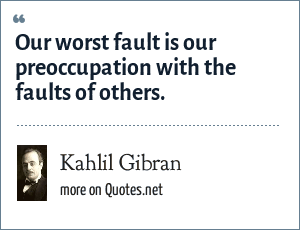Translation
Find a translation for this quote in other languages:
أسوأ ذنبنا هو انشغالنا بأخطاء الآخرين.
nuestro peor defecto es nuestra preocupación por los defectos de los demás.
بدترین عیب ما مشغولیت ما با عیب دیگران است.
हमारी सबसे बड़ी गलती दूसरों के दोषों के साथ हमारा पूर्वाग्रह है।
kesalahan terburuk kita adalah keasyikan kita dengan kesalahan orang lain.
ನಮ್ಮ ಕೆಟ್ಟ ತಪ್ಪು ಇತರರ ದೋಷಗಳೊಂದಿಗಿನ ನಮ್ಮ ಮುಂದಾಲೋಚನೆಯಾಗಿದೆ.
우리의 최악의 잘못은 다른 사람의 잘못에 집착하는 것입니다.
நம்முடைய மோசமான தவறு, மற்றவர்களின் தவறுகளை நாம் கவனிப்பதே.
మన చెత్త తప్పు ఇతరుల తప్పులతో మన ముందుచూపు.
ہمارا بدترین خطا دوسروں کے عیوب کے ساتھ ہماری مشغولیت ہے۔
我們最大的錯誤是我們全神貫注於他人的錯誤。
Select another language:
- - Select -
- 简体中文 (Chinese - Simplified)
- 繁體中文 (Chinese - Traditional)
- Español (Spanish)
- Esperanto (Esperanto)
- 日本語 (Japanese)
- Português (Portuguese)
- Deutsch (German)
- العربية (Arabic)
- Français (French)
- Русский (Russian)
- ಕನ್ನಡ (Kannada)
- 한국어 (Korean)
- עברית (Hebrew)
- Gaeilge (Irish)
- Українська (Ukrainian)
- اردو (Urdu)
- Magyar (Hungarian)
- मानक हिन्दी (Hindi)
- Indonesia (Indonesian)
- Italiano (Italian)
- தமிழ் (Tamil)
- Türkçe (Turkish)
- తెలుగు (Telugu)
- ภาษาไทย (Thai)
- Tiếng Việt (Vietnamese)
- Čeština (Czech)
- Polski (Polish)
- Bahasa Indonesia (Indonesian)
- Românește (Romanian)
- Nederlands (Dutch)
- Ελληνικά (Greek)
- Latinum (Latin)
- Svenska (Swedish)
- Dansk (Danish)
- Suomi (Finnish)
- فارسی (Persian)
- ייִדיש (Yiddish)
- հայերեն (Armenian)
- Norsk (Norwegian)
- English (English)
Quote of the Day Today's Quote | Archive
Would you like us to send you a FREE inspiring quote delivered to your inbox daily?
Citation
Use the citation below to add this quote to your bibliography:
Style:MLAChicagoAPA
"Kahlil Gibran Quotes." Quotes.net. STANDS4 LLC, 2024. Web. 24 Apr. 2024. <https://www.quotes.net/quote/2872>.



Discuss this Kahlil Gibran quote with the community:
Report Comment
We're doing our best to make sure our content is useful, accurate and safe.
If by any chance you spot an inappropriate comment while navigating through our website please use this form to let us know, and we'll take care of it shortly.
Attachment
You need to be logged in to favorite.
Log In